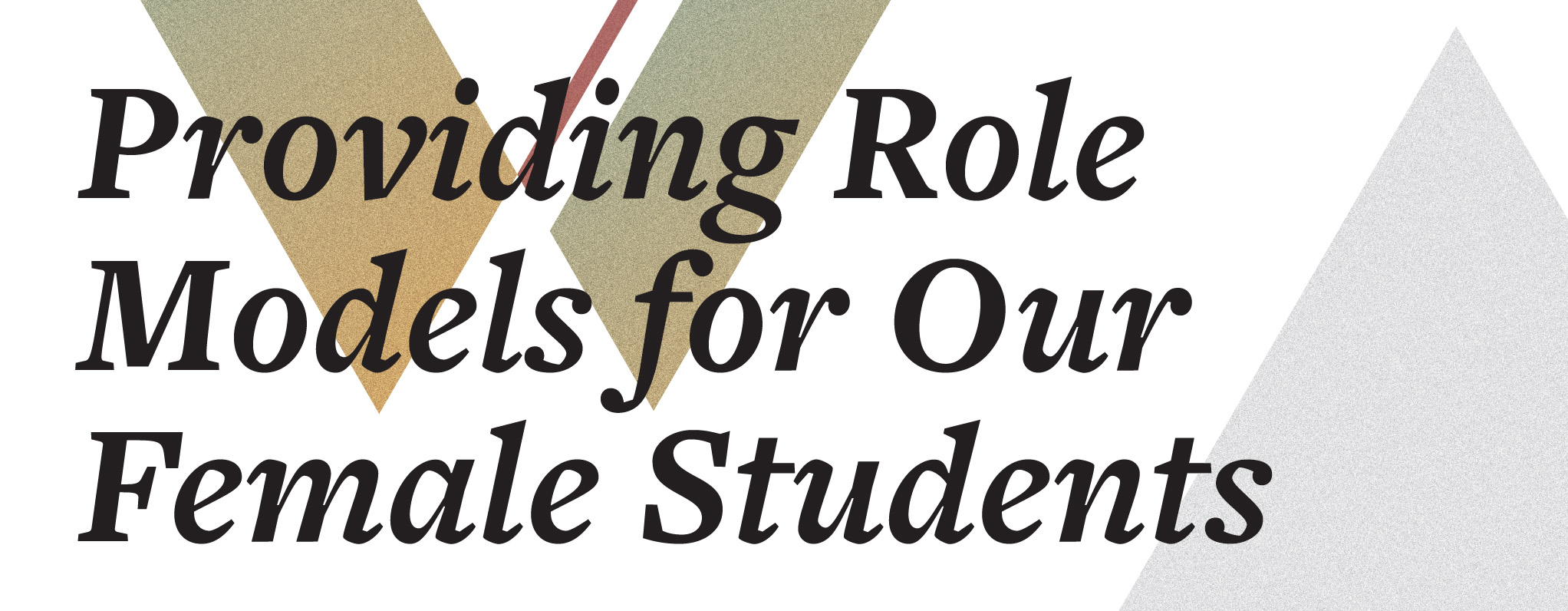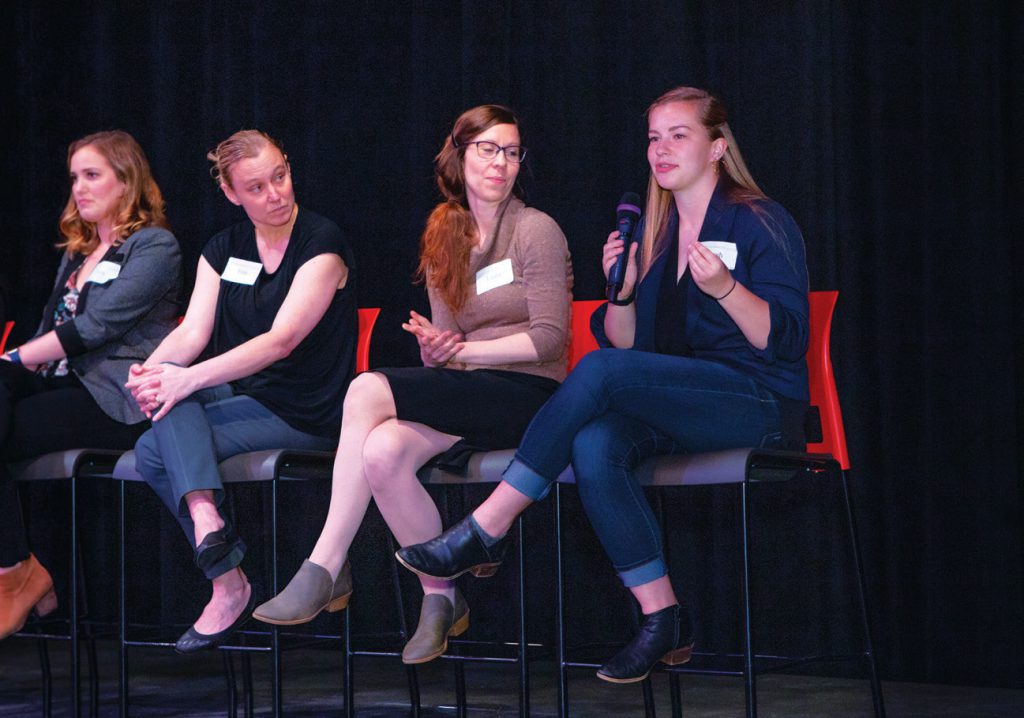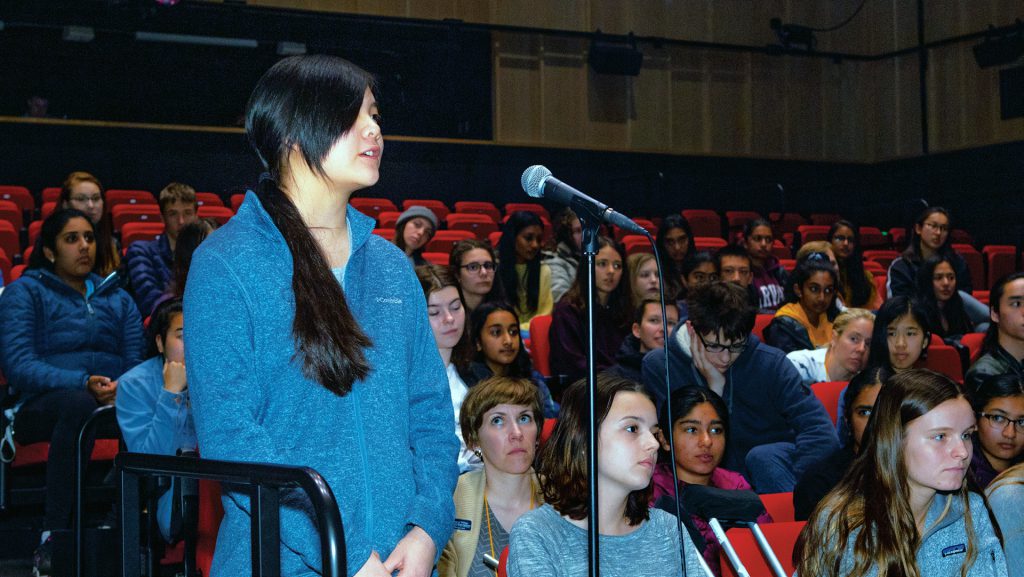
By Nickie Wallace, Science Faculty
FOR ME, ALL GREAT IDEAS START WITH A CASUAL conversation. This idea started with the state of gender differences in a local university computer science program. A friend of mine, Chantel Frizzell, was graduating from this program, and we were speaking about how it was really challenging for her to fit in and find allies in her classes. She shared that more than once, she was overlooked because of her gender. In one example, she was once confronted by a male peer about her use of a lab reserved for computer science majors.

Panelists at the Women in Medicine event
The conversation got both of us thinking about how we could get more strong role models in front of students, both in secondary and tertiary education. It is important for all students to see and hear from these women, and it’s especially important for female students to be able to see themselves in these roles. Microsoft Education completed a research project in Europe in 2018 about the importance of role models in encouraging girls to pursue a career in science and tech fields, and they found that meeting women working in those fields was more influential to young girls than celebrities. Research has also shown that young women from diverse backgrounds find it even more difficult to see themselves in these roles since the percentage of non-white women or LGBTQ+ women (as two examples) are lower than heterosexual, white women in science and technology fields.
I approached Vickie Baldwin with the idea of a women focused event at EPS, and we started brainstorming how it could work. There were two focal points for me in the planning process of this panel. First, I wanted to keep the conversation to one specific branch of the wide range of science and technology fields each year. While there are similarities in experiences of being a woman in any male-dominated environment, there are also nuances in each field that students need to see. Having broad coverage of these fields would not facilitate this, so I chose to narrow the discussion to one field.
The other focal point was to bring in role models who are already part of our community. Knowing a role model in science and tech fields is another driving factor to keeping young women in the pipeline. We are fortunate at EPS to have a strong parent community of professionals who are interested in giving their time to the school. I recognized that I had spoken to many parents who were in those fields in one way or another. By engaging women in our community, we allow students to see how families are balancing work and life, and the need for open communication with those around them.
Dr. Anne Duffy, chemistry teacher at EPS, said this about the importance of this panel: “These panels bring awareness on two fronts. It gives our female student population an understanding of the continued disparity when it comes to balancing work and family. But, of equal importance, we need the allegiance of our male population to help make changes more permanent.”
Sam Uzwack, Head of Middle School, reflected on the importance of these discussions, “It is crucial that younger women see role models in all industries, including math, science, tech, and medicine. It is also important to hear individual stories about what it is like to be in those industries as a woman. It’s also a way for all students to think about careers they may not yet have considered.”
With these ideas in mind, Baldwin and I started working.
WOMEN IN TECH – 2018
Since the field of IT has some of the lowest representation of women in the science/tech fields, I decided to start here. Seventy-five students met for lunch in the TMAC, and we had a forty-five-minute discussion on the experiences of our panelists in the IT field. There were seven panelists from different parts of the tech field and at different stages of their career. Lisa Conquergood’s valuable advice was that no matter what kind of career you want to pursue, you should be able to understand the tech behind it so that you can hold others accountable for their time. Serena Glover, who started at Microsoft in the early 80’s, encouraged everyone to get basic training in programming. She said that since all of us have these devices, it’s important that we know how they work and how to use them. Alison Northup gave the perspective that you don’t have to study tech in college to pursue a career in tech after college. She studied English and went to boot camp and is now working at Rover.com. Chantel Frizzell went back to university later in life to study computer science, and demonstrated that, like Alison, it is never too late to change career paths. Elena Camerini explained that spoken and coding languages are not that different, and learning both can be very beneficial. Stephanie Zhu shared that it is important to face injustice at each point in your journey, whether from a colleague or a teacher.
After the panel, Addison and Sanjana (both Class of 2024) joined the panelists for lunch. I recently asked them to reflect on that experience.
Addison said, “Something that really stuck with me was when the panelists from the Women In Tech panel told us that if we are interested in programming, then we should start learning it now because of the programming opportunities available to students in schools like ours. This inspired me to start learning Python, and I am still learning it a year after I heard that advice.”
Sanjana commented, “I remember one thing from the Woman in Tech panel is that to know a bit of coding or learn how to operate technology because no matter what field you are in, you are going to need to know how to operate technology. That was an interesting thing to think about because since so much technology gets developed every day, it has become such an essential part of our lives. I thought it was great advice because I knew kids from my old school who would think I was a ‘nerd’ because I like to code, and this event made me think about coding in a new way.”
WOMEN IN MEDICINE – 2019
In planning for the next panel discussion, I knew immediately what I wanted to focus on. In my fifteen years of teaching high school girls, I am always struck by the number of young women who want to become a doctor because they want to help people. However, health care is not just about being a doctor, and being a doctor sometimes means that you have to work in a system which doesn’t always lend itself to helping people. We put together a panel of women from many different sectors of the health care system—from working as a doctor to teaching about the economics of the US health care system.

Students and faculty at the Women in Medicine event
Dr. Emily Savage, an internist, spoke about finding a partner who will really share the job of having and raising a family. Communication was key for her mental health when her children were small. Erin Vernon, an economics professor at Seattle University, gave us a perspective on the history of the Affordable Care Act and what candidates are speaking about now in terms of single-payer healthcare. She also explained some of the challenges that doctors in this country face in terms of debt and why it can be hard to find a good general practitioner here. Sarah Krawczak (EPS Class of 2012) spoke about the challenges that people in smaller communities face in terms of signing up and understanding the health care system when they don’t even speak English as a first language. Dr. Prachi Munshi, an internist, spoke about really loving what she does. She considers herself fortunate to get to work with people over a longer period of time. Dr. Sara Pauk spoke about the challenges for women’s health care, especially through the diverse cultural lenses that she sees at Harbor View Medical Center. Laura Amendola, a genetic counselor, spoke about the innovations in health care that are available with genetic screening and the challenge that some people face trying to get screened. Dr. Srilatha Shoroff, an internist, spoke about the challenge that people have when they switch doctors so often. Not knowing your patients or doctor is challenging for both parties.
Overall, women spoke about the health care system as we know it and how it could be better. There were current innovations available, such as new genetic screening, as well as needed improvements, such as finding a better electronic system for patient records. Emily said that it can take hours to get all her notes into the current system for her patients each day (a plea to tech students in the audience).
After the panel, students joined the panelists for lunch in the LPC. With the expanded middle band, we had almost twenty students join the conversation, and I overheard people talking about everything from reproductive rights and laws around the country to college choices and career paths.
After two of these panels, I am awed by the response of our community in many ways. First of all, I’m appreciative of new ways to engage with the adult community here. Parents are willing to step up and shine a spotlight on what they are doing as well as answer personal questions about the challenges that they have faced. Being vulnerable about their experiences can be hard in front of an audience, and I’ve appreciated all of their energy and stories. Second, I am grateful for the connections that I’ve been able to make with more students. Like many of the activities we offer outside of the classroom, seeing students come to these panels means that I have had a chance to connect in a meaningful way with them. Last, their reflections on these experiences have highlighted the need for more opportunities like these.
Emma (’22) says, “I was struck by how much they genuinely loved their jobs and what they did. In news, so often there are complaints about healthcare and capitalism; so much so that simply helping people has become a political issue. I feel like I always am hearing about how doctor’s office visits are annoying or useless or how America would be so much better with free healthcare, but these women weren’t on the panel to complain; they were there because they genuinely love what they do. It was very refreshing to see that attitude.”
Addison (’24) said that she believes that these panels are helpful because she feels like a lot of information coming from fields of knowledge such as the tech field and the medicine field come from men in our society. “I think it’s really nice and inspiring to get to hear about the change women are making in mostly male-dominated fields and it also really inspires us to not be afraid to try something that this gender is ‘not fit to do.’”
Sonia (’21) reflected, “I decided to attend the panel because I wanted to see what opportunities and accomplishments I could achieve. I’m so glad I attended the panel to help decide my future and who I want to become.”
WOMEN IN ENGINEERING – 2020
Want to join us as a panelist? We’re looking for women civil, structural, biomedical, electrical, and mechanical engineers for our panel. Please contact Nickie Wallace (nwallace@eastsideprep.org) or Vickie Baldwin (vbaldwin@eastsideprep.org) for more information.
References for this article:
Master, Alison, Cheryan, Sapna and Meltzoff, Andrew N. “Researchers Explain how Stereotypes Keep Girls out of Computer Science Classes.” The Washington Post, 26 April 2016. //www.washingtonpost.com/news/education/wp/2016/04/26/researchers-explain-how-stereotypes-keep-girls-out-of-computer-science-classes/?noredirect=on. 27 Aug. 2019
Meltzoff, Andrew N. “Sterotypes, STEM, and a Sense of Belonging: How Psychological Science Can Improve Children’s Education.” BOLD. Jacobs Foundation, 13 Oct. 2017. //bold.expert/stereotypes-stem-and-a-sense-of-belonging//. 27 Aug. 2019.
“Girls in STEM: the Importance of Role Models.” Features. Microsoft, 25 April 2018. //news.microsoft.com/europe/features/girls-in-stem-the-importance-of-role-models/. 27 Aug. 201
